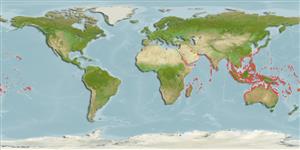Teleostei (teleosts) >
Mugiliformes (Mullets) >
Mugilidae (Mullets)
Etymology: Crenimugil: Latin, crenulatus = cut, clipped + Latin, mugil = grey mullet (Ref. 45335).
More on author: Forsskål.
Environment: milieu / climate zone / depth range / distribution range
Ecology
Marine; brackish; reef-associated; non-migratory; depth range 0 - 20 m (Ref. 89972). Tropical; 32°N - 32°S, 32°E - 143°W
Indo-Pacific: Red Sea and East Africa to the Line and Tuamoto islands, north to southern Japan, south to Lord Howe Island.
Size / Weight / Age
Maturity: Lm ? range ? - ? cm
Max length : 60.0 cm TL male/unsexed; (Ref. 9710); common length : 26.0 cm SL male/unsexed; (Ref. 9812)
Found in coastal waters, over sandy or muddy areas of lagoons, reef flats and tide pools; enters harbors (Ref. 9812). Schooling species, swim at various depths along reefs, to about 20 meters but usually much shallower. Feed on detritus containing algae and microscopic animals, by scooping up the upper layer of sand or mud and filtering through the gills (Ref. 48637). Omnivorous (Ref. 6113). Form large schools before spawning, at the beginning of the ebb tide (in June), over shallow, open areas of the lagoon slope (Ref. 9812). Oviparous, eggs are pelagic and non-adhesive (Ref. 205). Spawning occurs in large aggregations after dark. Marketed fresh (Ref. 9812). Minimum depth reported taken from Ref. 30874.
Randall, J.E., G.R. Allen and R.C. Steene, 1990. Fishes of the Great Barrier Reef and Coral Sea. University of Hawaii Press, Honolulu, Hawaii. 506 p. (Ref. 2334)
IUCN Red List Status (Ref. 130435)
Threat to humans
Reports of ciguatera poisoning (Ref. 130160)
Human uses
Fisheries: minor commercial; aquaculture: commercial; bait: occasionally
Tools
Special reports
Download XML
Internet sources
Estimates based on models
Preferred temperature (Ref.
123201): 24.6 - 29.3, mean 28.3 °C (based on 3397 cells).
Phylogenetic diversity index (Ref.
82804): PD
50 = 0.5625 [Uniqueness, from 0.5 = low to 2.0 = high].
Bayesian length-weight: a=0.01622 (0.01033 - 0.02547), b=2.96 (2.83 - 3.09), in cm total length, based on LWR estimates for this species & (Sub)family-body (Ref.
93245).
Trophic level (Ref.
69278): 2.3 ±0.10 se; based on food items.
Resilience (Ref.
120179): High, minimum population doubling time less than 15 months (Fec=195,000-897,000).
Fishing Vulnerability (Ref.
59153): Moderate vulnerability (44 of 100).
Nutrients (Ref.
124155): Calcium = 45.7 [18.2, 140.3] mg/100g; Iron = 0.585 [0.273, 1.350] mg/100g; Protein = 18.9 [17.1, 20.7] %; Omega3 = 0.172 [0.087, 0.355] g/100g; Selenium = 31.8 [16.7, 67.7] μg/100g; VitaminA = 55 [14, 220] μg/100g; Zinc = 1.68 [1.09, 2.55] mg/100g (wet weight);
